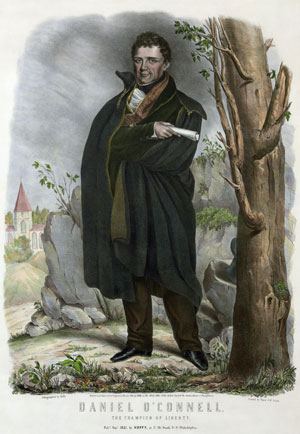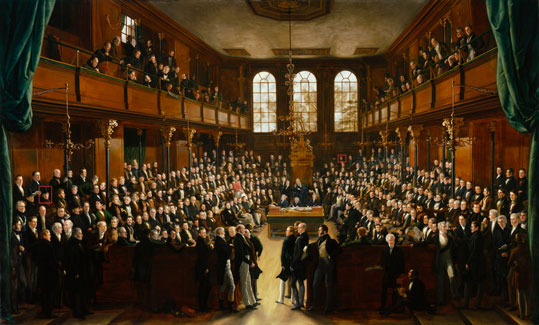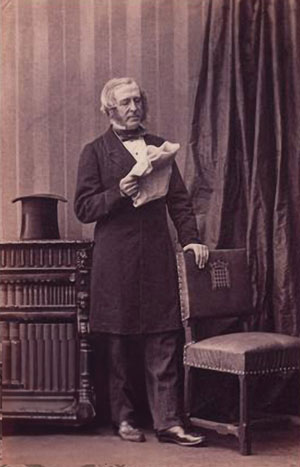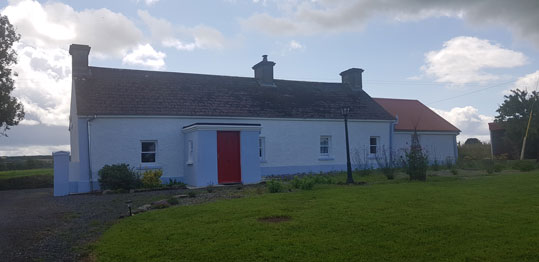By Stephen Collins

In the decade after Catholic Emancipation in 1829 Ireland was convulsed by political agitation, as Daniel O’Connell led a concerted campaign to get his supporters elected to the House of Commons. Longford was a prime example of how the battle lines were drawn during a series of elections in the 1830s; while only a small minority of people had the right to vote, the wider population had an important influence on the results.
WHO COULD VOTE?
The general election of 1832, the first to take place after the Great Reform Act, set the tone for politics in Longford over the following decade, as the county was riven by bitter political division. Just 1,284 people out of a population of 112,391 were entitled to vote in 1832. The right to vote depended on two things: the value of the land or property held by a person and the type of lease involved. Those who had leases for specified lives, a common feature of the day, could vote if their valuation was £10 or more. The issue was how that valuation was to be determined.
About 12% of the population of Longford was Protestant and almost all Protestant tenant farmers were given the kind of lease and valuation that would qualify them as voters. O’Connell’s organisation and the priests who were its backbone tried to ensure that as many Catholic tenants as possible were also put on the electoral register so that the wishes of the majority would prevail at election time. The law about property valuation was interpreted in Longford as meaning the value of a tenancy for which another person would be prepared to pay £10. To be included on the first new electoral register after Emancipation, voters had to attend a court hearing in Longford town or Ballymahon.
The registration process prefigured the bitterness of the elections themselves. Voters were challenged as to the value of their land, with the Tories trying to keep the number of Catholic voters as low as possible by insisting that the law required a tenant to make a clear profit of £10 a year from his holding. There was bedlam in the courthouse in Ballymahon, as Catholic applicants arranged for neighbours to jump up shouting ‘I’ll give £10 for that man’s lease’.
1832 GENERAL ELECTION

In the general election of 1832 the power of the Tory landlords in the county, represented by George Viscount Forbes of Castle Forbes and Anthony Lefroy of Carrickglass Manor, was challenged by a wealthy liberal Protestant landowner, Luke White of Rathcline House, and his running mate, J.H. Rourke, who both supported O’Connell. White’s father, a bookseller from Cork also called Luke, was reputed to be the richest man in Ireland in the early 1800s and had acquired property in different parts of the country for his sons. The Longford Liberal/Repeal Club sponsored the challenge but the strength of the campaign was due to the vocal support of the Catholic clergy across the county. Priests told their congregations at Sunday Mass that it was their duty to God and country to support O’Connell’s candidates.
White topped the poll in the two-seat constituency with 649 votes, followed by Rourke with 645, with Forbes on 587 and Lefroy on 582. The Repeal Club triumph was short-lived, as both their candidates were unseated the following year as a result of a petition by Lefroy claiming that their victory had been achieved with illegal voters who did not meet the £10 valuation threshold. It was the first in a series of elections that saw White topping the poll only to be unseated by the Tories, who used their majority in the Commons to back petitions instigated by unsuccessful Tory candidates. The outcome was that in April 1833 White and Rourke were ejected from the House and the seats awarded to Forbes and Lefroy.
1836 BY-ELECTION
In the general election of 1835 White tried again, and this time his brother, Col. Henry White, a hero of the Peninsular campaign, was his running mate. Demoralised by the outcome of the petition in 1833, their campaign was lacklustre and Forbes and Lefroy were comfortably re-elected. A by-election was required the following year, however, owing to the death of Forbes. The Tory interest banded together to back another well-known landowner, Charles Fox of Foxhall House near Legan, but this time Luke White made a determined effort to win back the seat following the registration of a significant number of new Catholic voters.
Longford town was thronged for the by-election, which took place in the bitterly cold week after Christmas 1836. People from all over the county descended on the town for five days in succession. Most of those who surged around the courthouse during the by-election were not actually voters, as only men who could claim a property valuation of £10 were entitled to the franchise, but thousands of other people came into the town every day that week to ‘encourage’ voters to do the right thing in the open ballot.
Intimidation by both sides was rife. Some landlords threatened tenants with eviction if they didn’t support the Tory candidates, while the Catholic clergy made no bones about whipping up hostility to voters who did not support the Repeal/Liberal side. For instance, the pews installed by some of the better-off Catholic farmers in the parish church at Ardagh were smashed to pieces by an angry congregation when they failed to support White in 1832. At election time the priests in the county didn’t simply tell people from the altar how to vote; they led them in procession into Longford town for the polling, with a priest riding at the head of each troop of voters, who were mainly on foot and accompanied by a far greater number of non-voters.
BRIDGET PRUNTY

During the polling, Bridget Prunty, a farmer’s wife, was catapulted to national fame when she publicly intervened to tell her husband how he should vote. Peter Prunty, a Catholic voter of Fardrummin, Killoe, had been taken, allegedly under duress, to the seat of the Lefroy family at Carrickglass on Christmas Eve just before the election, which was due to begin on St Stephen’s Day. He was one of a number of voters who were brought, willingly or unwillingly, to Carrickglass for the duration of the voting.
Prunty was an elderly man but his feisty wife, Bridget, drew the attention of the Repeal organisation to his incarceration at Carrickglass and it soon developed into a political storm that was reported in the Dublin newspapers and taken up by papers across the United Kingdom. A flavour of the week’s events was captured by a correspondent for The Pilot, a Dublin newspaper that backed O’Connell. He reported that by 1pm on Monday 26 December, the first day of polling, the town was filled with people and ‘the greatest exertions are being made to preserve the peace’. He further reported that two of White’s supporters had been shot by armed bands backing Fox and that one of them had been badly wounded, with a musket-ball shattering his thigh:
‘A troop of Dragoons and a company of infantry were called out by the High Sheriff and although it is disgraceful to our country to have an election conducted under the controlling influence of the bayonet and the sabre, yet I am willing to admit that there is in the present case, an imperative necessity for such a proceeding’.
It was the practice in those days of open voting for both sides to bring their voters into the polling station in batches of five to publicly declare support for their candidates. It was a slow process, as checks were made as to whether voters were on the electoral register, with oaths being required to verify identity and eligibility. The contest was even for the first two days, with an announcement at the end of the second day’s polling that White had 196 votes and Fox 195.
By that stage Bridget Prunty, with the support of White’s election agent, had sworn an affidavit for the local magistrates claiming that her husband was being held against his will at Carrickglass Manor. She told how she had gone to the Manor and spoken to her husband through the iron gates, and he had informed her that he was being kept there against his will and if he could get out he would vote for White. Two other tenant farmers, John Corcoran and Thomas Farrell, swore affidavits that attempts had also been made to detain them. Farrell said that he had been escorted to Carrickglass, where he saw Prunty, but he quickly made his escape and returned home.
On Thursday 29th Prunty was finally brought into the town to cast his vote. The correspondent of The Pilot described the scene.
‘On this day Prunty was brought to town in a chase from Carrickglass guarded by Dragoons. His wife was standing on the corner of Water Street, watching his progress. And as he passed, she made an appeal to his heart which united the happiness of this world with the glories of the next. She exclaimed, “Oh, Prunty, remember your soul and your liberty.” Prunty was brought up upon Fox’s tally, but voted for White.’
Mrs Prunty’s intervention became the sensation of the campaign, featuring in the Dublin press and provincial papers throughout Ireland. It was even taken up by newspapers around the UK, where the novelty of a woman publicly telling her husband how to vote generated great attention.
UNASSAILABLE LEAD FOR WHITE
Prunty’s vote helped to propel White into an unassailable lead by Thursday night. ‘The shout of victory resounded from one end of the town to the other and the joy and enthusiasm manifested by the people exceeded anything I have ever witnessed. Not excepting the memorable election of Clare in 1828’, reported The Pilot correspondent. White then addressed the packed courthouse to wild cheering, which spread through the dense crowds in the surrounding streets.
‘My friends, it is not my victory. It is your country’s victory. And it is your country’s cause. You are the men who have the ability to fight for your country’s freedom. I am nothing. I could do nothing without the honest frieze coats. And God forbid that any of these honest men should fall a sacrifice for having done their duty to their country. The frieze coats shall not fall, their virtue and their patriotism demand that the shield of justice should be held over them and that no man should be allowed to suffer.’
When the result was announced the following day, White was declared the winner by the comfortable margin of 619 votes to 526.
In early January Daniel O’Connell wrote a public letter from Tralee asking that the General Association, his political organisation, should ‘testify their respectful admiration of the conduct of Mrs Prunty, the wife of a Longford freeholder, by presenting her with some small token of their respect, such as a shawl or other suitable article’. It seems that the Association presented Mrs Prunty with more than a shawl. The Tory-supporting Dublin Evening Mail reported sarcastically that Mrs Prunty, who had ‘successfully interfered to induce her husband to vote for Mr Luke White, the Ministerial candidate in the late election’, had been presented by the committee of the General Association with ‘a horse, bridle, saddle, pillion, cloak and bonnet as a reward for her patriotic conduct’.
MRS PRUNTY’S EXAMPLE
Bridget Prunty’s example inspired other women to put pressure on their husbands to support the nationalist cause. In the general election of 1837 another Longford woman, Mrs Magee, used Mrs Prunty’s exact words—‘vote for your soul and your liberty’—as she exhorted her indecisive husband to vote for White. A number of wives were reported as threatening to deny conjugal rights to their husbands if they voted against the national cause.
White’s triumph in 1836 was short-lived, as he was again unseated on petition and the seat awarded to Fox in May 1837. It was a pyrrhic victory for Fox, as a general election followed soon after in July 1837 and White entered the fray once more. He and his brother Henry, his running mate, easily defeated Lefroy and Fox. As the Whigs had won a decisive majority in the House of Commons, the result was not challenged and Luke White finally served a full term as an MP.
The White brothers were re-elected in 1841, but the defeated candidate, Anthony Lefroy, again instituted a petition to have Luke unseated. Lefroy was successful on this occasion, as the Tories now had a majority on the committee hearing the petition. Henry’s election was not challenged. Having been once again forced to relinquish a seat that he had won four times in a decade, White didn’t contest another election and he died in 1854 at the age of 65. His brother Henry continued as an MP for more than two decades and was ultimately raised to the peerage as Baron Annaly in 1863.

FAMILY CONNECTION
My interest in Longford politics in the nineteenth century developed out of research into family history. I discovered that my great-great-great-grandfather, Thomas Farrell of Graffogue, and his son William had registered as voters in 1835, claiming a £10 valuation on the basis of leasing around twenty acres of land each. They voted for White in 1836, 1837 and 1841, but were both declared illegal voters and struck off in 1837 and again in 1841 following petitions by Lefroy. Thomas got himself back on the voters’ register in 1842. There is a wealth of information about the electoral process and general conditions in the county in the minutes of evidence given to the House of Commons committees hearing the Longford election petitions of 1837 and 1841.
An interesting footnote to the political battles of long ago is that the White family who represented the nationalist cause left their estate at Rathcline before the end of the nineteenth century. By contrast, the Forbes family still retain their ancient seat at Castle Forbes, while the Lefroy family remained at Carrickglass Manor until the property was sold for development in 2005.
Stephen Collins is a columnist with and former political editor of the Irish Times.
Further reading
K.T. Hoppen, Elections, politics and society in Ireland 1832–1885 (Oxford, 1984).
A. McIntyre, The Liberator: Daniel O’Connell and the Irish Party 1830–1847 (London, 1965).
